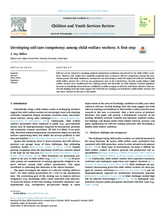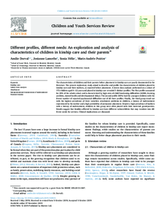This page contains documents and other resources related to children's care in the Americas. Browse resources by region, country, or category.
Displaying 1201 - 1210 of 3191
This chapter from the book Education in Out-of-Home Care outlines the skills that are necessary for a successful start to formal schooling for children placed into out-of-home care (OHC).
The present research from the book Education in Out-of-Home Care examined the question of possible gender effects of a tutoring program for children in foster care in Ontario, Canada, as well as several other questions of a practice-related nature, including the impact of implementation fidelity on the effectiveness of the tutoring program and the children’s and caregivers’ perception of the tutoring.
The constitutionality of the Indian Child Welfare Act (ICWA) - a law meant to prioritize the placement of Native American children up for adoption with members of their family, their tribe or other Native American families - is now being challenged in the the U.S. Court of Appeals for the 5th Circuit, according to this article from the Washington Post.
This study employed a retrospective pre/post design to assess the impact of a self-care training for child welfare workers (N=131) in one southeastern state in the United States.
The present exploratory study aimed to describe and profile the characteristics of children placed in kinship care and their mothers, as reported before placement.
This article draws from the authors’ experiences of implementing ecologically-based treatment models based on multisystemic therapy, including the Neighborhood Solutions Project (NS) and Multisystemic Therapy for Child Abuse and Neglect (MST-CAN). The authors call for a rigorous multisystemic approach to the protection of children, one that pays attention to children at risk of harm and those who are involved in formal child protection systems because they have experienced maltreatment.
The present exploratory study aimed to describe and profile the characteristics of children placed in kinship care and their mothers, as reported before placement.
"A federal judge has ruled that the [US] government must provide mental health services to thousands of migrant parents and children who experienced psychological harm as a result of the Trump administration’s practice of separating families," according to this article from the New York Times.
This article explores the extent of previous child welfare involvement and its association with well-being among children in informal kinship care.
This chapter’s aim is to report the experience of using Ecological Engagement in a research of interdisciplinary character developed with teenage girls, aged 10–14, inserted in two care institutions for protection measures in Pernambuco state, Brazil.



